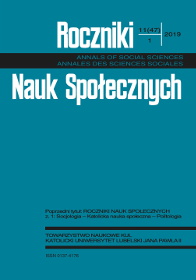Rosatellum – włoski system wyborczy i jego wpływ na wynik wyborów parlamentarnych
Italian Election System and its Impact on the Result of Parliamentary Elections
Author(s): Rafał DudałaSubject(s): Politics / Political Sciences, Politics, Civil Society, Electoral systems
Published by: Towarzystwo Naukowe KUL & Katolicki Uniwersytet Lubelski Jana Pawła II
Keywords: Italy; electoral system; Italian electoral law; Rosatellum; Italian general election (2018)
Summary/Abstract: The Italian electoral system has undergone various transformations over the centuries, usually caused by systemic changes. From the time of the Kingdom of Italy, through the period of fascist rule, the formation of the republic’s system, and the transformations of the early 1990s, this relationship is visible everywhere. The result of the evolution of the electoral system is the latest statute called Rosatellum. It is an example of a mixed system: 61% of members of parliament are elected in a proportional system and in multi-member constituencies, while 37% in a majority system and single-member constituencies. 2% is assigned to foreign counties, where only the proportional system applies. In addition, it maintains electoral thresholds for individual lists and coalitions, rejects the majority bonus, introduces a new arrangement of electoral cards, gender parities and coupons to prevent fraud. It was first used during the March 4, 2018 elections. On account of tensions hindering the formation of a new government, many commentators wrongly sought the reasons for a political pat in the new law.
Journal: Roczniki Nauk Społecznych
- Issue Year: 47/2019
- Issue No: 1
- Page Range: 113-134
- Page Count: 22
- Language: Polish

